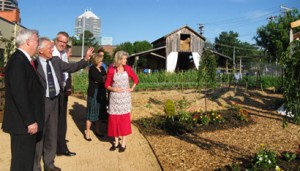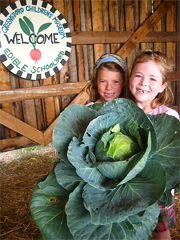Creative Teaching and Learning – Archives
Hands-on learning is reaching new heights in North Carolina.
That’s what I discovered when I visited the Greensboro Children’s Museum’s Edible Schoolyard.
The new exhibit is part of the NC State College of Design’s Natural Learning Initiative, a landmark effort in putting unconventional education to work through a little digging in the dirt. The museum garden brings high hopes for transforming the way we learn about and interact with our food, promoting outdoor learning among children in the state.
It is the first of its kind in North Carolina and a national model for other institutions promoting health and wellness among children and families, grounded in a national movement to help kids grow up with practical knowledge about their environment.

The Edible Schoolyard has been four years in the making, but even in the midst of economic challenges, the people of North Carolina have seen it through because of a belief in the power of creative education.
Despite the difficulties of tight state spending on higher education, the hard work behind this kind of initiative continues to give me confidence that NC State will emerge from this challenging time stronger than ever.
In fact, NC State was honored with the 2010 Howard Hughes Medical Institute Research University Award for its creative programs in teaching and research in undergraduate and K-12 education. We were one of fifty universities selected for this $1.5 million award, which demonstrates the confidence invested in our creative teaching programs.

Sometimes unconventional ways of learning can be the best ways of learning, and certainly, our greatest challenges require the enthusiasm for knowledge and out-of-the-box problem solving that come with an unconventional education.
It is heartening to see creative teaching and learning in action across the state, whether it begins in a children’s garden or high-tech lab. I am proud to be a part of North Carolina’s education network and of NC State’s role in transforming our state as we work together on the road ahead.
Randy Woodson
Chancellor
NC State University
- Categories: